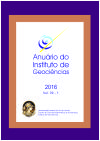Hydrogeological Characterization of a Lake Bank Filtration System
DOI:
https://doi.org/10.11137/2016_1_133_141Keywords:
Bank filtration, Aquifer test, PotentiometryAbstract
Riverbank filtration (RBF) is a technique that has been successfully used in many countries, as a pre-treatment for water supply purposes, especially in regions under high demand. The technique comprises the construction of well(s) located at river/lake margins, and the water collected in the well is a mixture of surface water and groundwater. Hydrogeological approach is important in this context because it provides a better knowledge of the interaction between surface water and groundwater, and an evaluation of how physical environmental characteristics influence on water quality and quantity. Viçosa city, Minas Gerais State, Brazil, has an increasing demand of water resources and a shortage of drinking water sources. In this context, the proposed pilot bank-filtration design under study was constructed in 2013 in the margins of a dam at Universidade Federal de Viçosa campus, with the main purpose of generating hydrogeological data for the complete characterization of the designed system. This paper presents the results of a detailed characterization based mainly on pumping and recovering hydrogeological aquifer tests and potentiometric monitoring. Results show that the hydrogeological characteristics of the study area favor the efficiency of the RBF system and can supply considerable amounts of water at low cost, especially during dry seasons.Downloads
Download data is not yet available.
Downloads
Published
2017-02-15
How to Cite
Rocha, S. F. and Marques, E. A. G. (2017) “Hydrogeological Characterization of a Lake Bank Filtration System”, Anuário do Instituto de Geociências. Rio de Janeiro, BR, 39(1), pp. 133–141. doi: 10.11137/2016_1_133_141.
Issue
Section
Article
License
This journal is licensed under a Creative Commons — Attribution 4.0 International — CC BY 4.0, which permits use, distribution and reproduction in any medium, provided the original work is properly cited.















